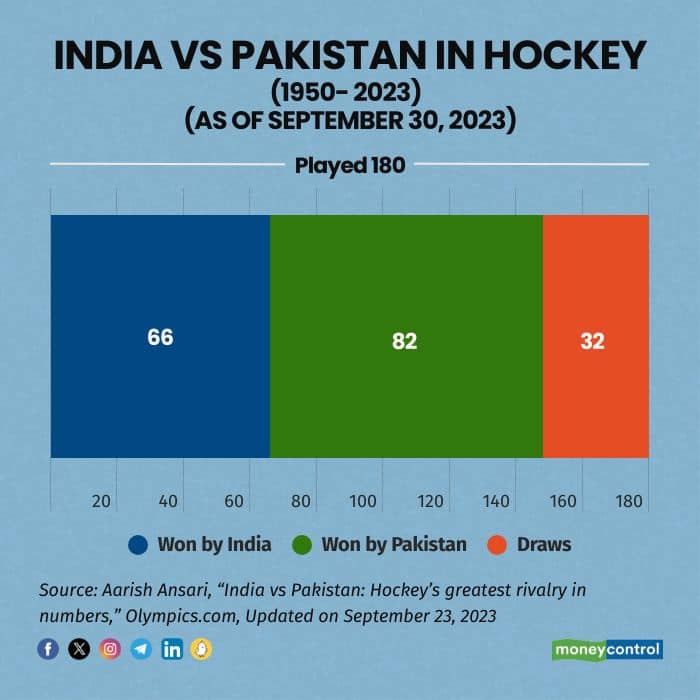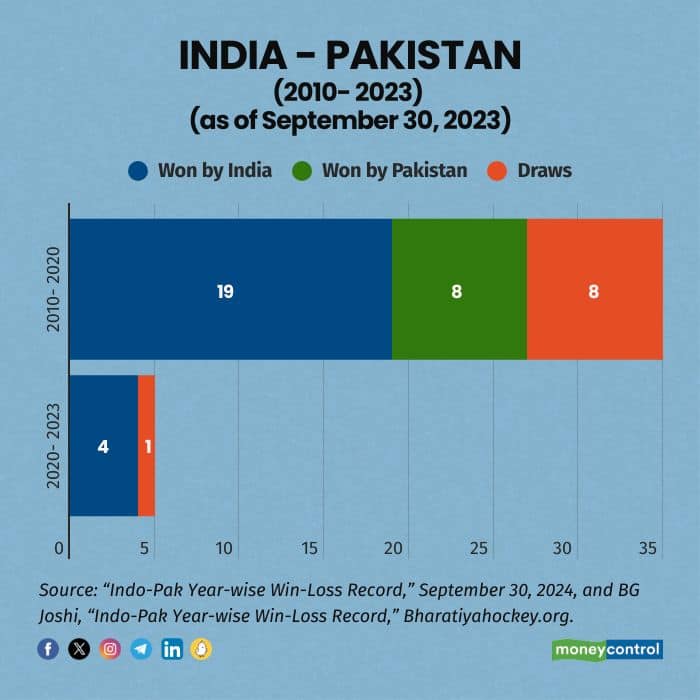



At the 1948 London Olympics “the Indian and Pakistani teams were billeted at different places,” says the late Indian hockey player Balbir Singh Senior. “Our old friends were deliberately keeping a distance from us.”
Sport had drawn its Radcliffe Line with Indian and Pakistani athletes awkwardly poised.
Cultural separation and the quest for strategic equivalence
Pakistan’s grievance culture had entered sport. Athletes must champion the state ideology to receive funding. If Pakistan’s founders felt they must be “separate and superior” to Indians, athletes felt the same. Thus began Pakistan’s enduring quest for strategic equivalence.
This feeling of strategic equivalence might have shaped attitudes in hockey.
At the 2017 Asia Cup in Dhaka, with India ahead 3- 0 against Pakistan I expressed frustration about the Indian team’s play, wondering how it would cope with stronger European teams. A bemused Hassan Sardar, the former Pakistani international player sitting beside me, said: “But your team is leading!”
Underlying was his feeling that India must be judged by its performance against Pakistan, not against better European teams. Sardar’s thinking was steeped in equivalence.
Curiously, defeating Pakistan was (and still is) considered the ultimate victory, tying Indian hockey players into the equivalence Pakistanis propose. In 2017, former Indian hockey coach Roelant Oltmans had said that defeating Pakistan or winning in Asia was no longer India’s highest ambition, but players forget. How else can we explain that Pakistan wins 82- 66 head-to-head?

Whether it was the psychology of equivalence that helped Pakistan outperform India is hard to tell. We can’t prove a feeling because “mind games” can’t be measured. Economic factors work better at explaining performance trajectory.
Correlation between economic success and victories in sports
Gustav Papanek observes that, by the mid- 1960s Pakistan’s economy grew at double the rate of the population, investment stood at 20 per cent of GDP, prices were stable, and foreign exchange reserves grew at 7.5 per cent a year. President Ayub Khan was hailed as “Asia’s de Gaulle.” India was hobbled by the so- called “Hindu rate of growth.”
Pakistan felt bolstered by its partnership with the US, holding the edge in hockey up to 2010.

The Soviet invasion of Afghanistan in 1979 yielded a US military and economic package worth $ 3.2 billion. Between 1977- 1981 the annual average growth rate stood at 6.2 per cent. In 1977-78, GNP grew by 9.2 per cent, agriculture by 4. 3 per cent, and industry by 4. 7 per cent.
Between 1980 and 2000 Pakistan won the hockey rivalry 35- 23, displaying greater hunger and higher ambition.
At the 1996 Atlanta Olympics the author observed Pakistani players looking dejected after drawing a match against India, while Indian players were performing a victory lap.
India pulls ahead in both hockey and economic performance
In the last decade the situation has reversed. According to the World Bank, Pakistan’s GDP was $400.18 billion in 2022. Forty fourth ranked Pakistan’s growth flatlined in 2023, while India grew at 7.6 percent.
India has been climbing the ranks when it comes to economic size. In 2022, India’s GDP stood at $2.97 trillion. In 2023, the $3.2 trillion Indian economy had climbed to fifth rank, overtaking the U.K. In 2030, India’s GDP is estimated to reach $5.91 trillion, with 7.30 per cent of global share, whereas Pakistan’s GDP will be only around $427 billion, according to estimates.
India’s faster annual growth rate will increase the distance between the economies in terms of GDP.

In the decade between 2010 and 2020 India won the hockey rivalry 19- 8. With the economic gap further widening (in 2023 the ratio was about 1:7 in terms of GDP) India is 4- 0 head-to-head in the decade beginning 2021. Pakistan might already have ceased to be India’s rival in all but name.
Resources help preparation
With a dire economy Pakistan could field a team for the 2018 men’s senior World Cup only after Peshawar Zalmi stepped in to sponsor. India hires better coaches and strategically-minded managers. Unelected Pakistani managers compare poorly with elected Indian officials.
With such a dire economy the feeling of equivalence appears to have lost force, except as a totemic principle. “The [Pakistani] team, despite showing good form, failed to overcome the psychological barrier in a high-pressure game against its arch-rival,” says Dawn about a match at the 2016 Asian Champions Trophy.
At the 2018 Commonwealth Games “Pakistan’s late 2-2 draw against India … has [the] feel of a win,” AFP said. “If these young boys go out there, fight and stand equal against India, that is a win for us as coaches," said Pakistan’s head coach Rehan Butt ahead of an Asian Champions Trophy match in 2023.
While Pakistani athletes have injected supremacist Islam and have gamed into the Partition mythology (this is more common in cricket), Indians pursue hyper- nationalism. “I get into revenge mode during a Pakistan game and my blood also boils," said PV Sreejesh after India defeated Pakistan in the gold medal match in the 2014 Asian Games. Home Minister Amit Shah termed India’s victory in the 2019 cricket World Cup “another strike on Pakistan.”
Boycotts have not promoted state interests. A diplomatic boycott targets governments and the policy community but sport touches citizens. Bans deprive millions of the joy of sport. Pakistanis will not re-think India just because of boycotts which do little to undermine Pakistan’s state ideology. Instead, boycotts might turn Pakistanis hostile.
Boycotts also means that people forget the rivalry. It wasn’t the case in the past. As India fought back from a deficit, European commentator at the 2003 Champions Trophy match in Amsterdam exclaimed: “We knew this was going to be special, but not this special.” The BBC calls the rivals “fierce competitors” playing “derby” matches. The FIH has a film “The Fiercest Rivalry in Hockey.”
What does the future hold?
Currently India and Pakistan play only in FIH and invitational tournaments. Media build-up in neutral venues is limited, and fans express bewilderment at Pakistan’s repeated defeats. Those not born Indian or Pakistani don’t understand. With interruptions, and Pakistan’s decline, interest in the rivalry is waning. Who valorises the defeated?
Discover the latest Business News, Sensex, and Nifty updates. Obtain Personal Finance insights, tax queries, and expert opinions on Moneycontrol or download the Moneycontrol App to stay updated!
Find the best of Al News in one place, specially curated for you every weekend.
Stay on top of the latest tech trends and biggest startup news.